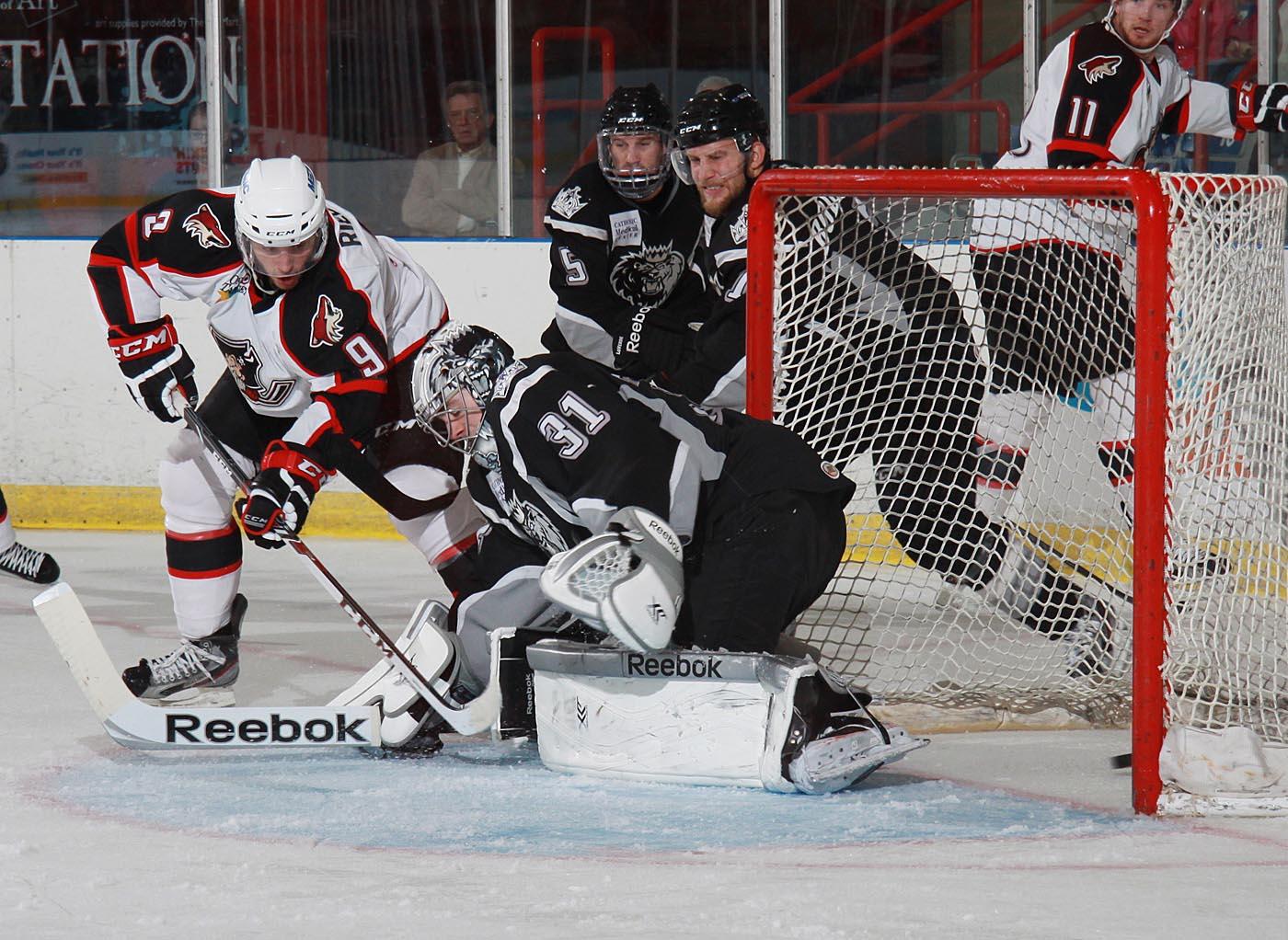by Kirk Dyson || AHL On The Beat Archive
The Portland Pirates have a few notable names on their roster. The Phoenix Coyotes’ system has plenty of young talent, from defensemen like Brandon Gormley and Connor Murphy to forwards Chris Brown and Andy Miele.
But rookie forward Tobias Rieder is starting to make his mark.
Rieder does not look like an intimidating force up front — standing 5-foot-10 and weighing 185 pounds, Rieder is one of a few smaller-sized forwards that make up the Pirates’ offensive corps. But what he lacks in size he makes up for in speed, hockey IQ and creativity, which is helping him succeed in Portland.
Growing up in Landshut, a city with a population of about 64,000 in the southeastern part of Germany, Rieder had a different experience than many of his teammates.
"It’s way different than over here, obviously," Rieder says about playing hockey in Germany as compared to North America. "Hockey’s not the number one sport in Germany, so lots of the kids play soccer. I played soccer as well and I just got into hockey because my dad was playing."
Rieder began his professional hockey career playing for EV Landshut in Germany’s DEL2, the second level of ice hockey in Germany below their Deutsche Eishockey Liga. After playing for the team’s under-18 club in 2008-09, Rieder joined the Cannibals in 2009-10 and recorded 23 points (10 goals, 13 assists) in 45 games.
He was then drafted fifth overall in the 2010 Canadian Hockey League import draft by the Ontario Hockey League’s Kitchener Rangers.
The move to Kitchener was a big one for Rieder, who not only had to move thousands of miles from home but also learn a different style of hockey.
"There’s a lot of big differences," Rieder said about the switch. "The rink is smaller, you play against the best guys in your age group over here and it was more physical, just faster and quicker. You just have to make decisions way quicker, that’s about the biggest difference."
The transition seemed to be a smooth one as Rieder finished with 49 points in 65 games while adding two assists in seven playoff games his rookie season for Kitchener in 2010-11. Rieder was then selected in the fourth round of the 2011 NHL Entry Draft by the Edmonton Oilers.
He returned to Kitchener for his second year and excelled, leading the Rangers with 42 goals, 43 assists and 85 points in 60 games while adding another 27 points in 13 playoff games. He also played for Germany in 2011-12 at the World Junior Championships Division I, scoring five goals and adding eight assists for 13 points in five games as Germany went 5-0 and won Group A.
In his final season with Kitchener, Rieder had a slightly disappointing year, tallying 56 points in 52 games after a slow start to the season. In the playoffs, Rieder was able to record 12 points in nine games before breaking his hand.
He was then traded by Edmonton to the Phoenix Coyotes in exchange for forward Kale Kessy in March 2013.
In all, Rieder’s three years in the OHL were impressive as he finished with 92 goals, 98 assists and 190 points in 177 games played. He added 15 goals, 26 assists and 41 points in 32 playoff games for Kitchener, making Portland Pirates head coach Ray Edwards very eager to add him to the roster.
"We knew he was a 200-foot player, we knew that he was a big game player — in the playoffs he played very well for Kitchener — so we were pretty excited about the acquisition," Edwards said.
And in his first game in a Pirates uniform on Oct. 9 vs. Manchester, Rieder showed his big play capabilities, notching his first two goals in the AHL — both coming on the power play.
But Rieder then suffered an injury, sidelining him for a month. When he was finally able to get back into action, Rieder picked up where he left off, again scoring two goals in only his third AHL game, Nov. 10 at Worcester. So far, through 11 games played, Rieder shares the team lead in goals (6) and is fourth in points (8) while leading the team in power-play goals with three.
And though Rieder has still only played a handful of games, Edwards has been impressed with the rookie forward.
"He’s a smart, smart player," Edwards said. "He’s always in the right spot offensively, defensively, thinks the game real well. He’s a competitive guy. He’s not a big guy, but he’s competitive. He’s hard on the puck, he wants to get the puck, he wants to have the puck."
Because of this, Edwards uses Rieder in all situations — on the power play, the penalty kill and even as a top-six forward.
And though that could add a lot of pressure to a rookie like Rieder, he appears to be transitioning well to life in the AHL and in Portland.
"We have a great group of guys, the older guys help the younger guys out a lot," he said. "I like everything about it [Portland], Coach gives me a lot of chances to play in every situation and I love it here."
While he is trusted in a variety of situations and has played well during his first 11 games, both Rieder and Edwards believe there is still room for improvement.
"I’d like to improve in everything," Rieder admitted. "I have to get stronger and just compete against those men out there and be hard on pucks, protect pucks down low and stuff like that."
Edwards agreed that building strength should be one of Rieder’s top priorities going forward.
"The problem with smaller guys, if they don’t compete at a really high level, sometimes they can get lost in the game, so he’s going to have to continue to get stronger," Edwards said. "If he continues to get stronger and faster and compete at a high level the rest of the season his skill set will come out."
If you watch Rieder practice, there is little doubt he will work his hardest to improve, which makes him another Phoenix prospect worth keeping an eye on.






































